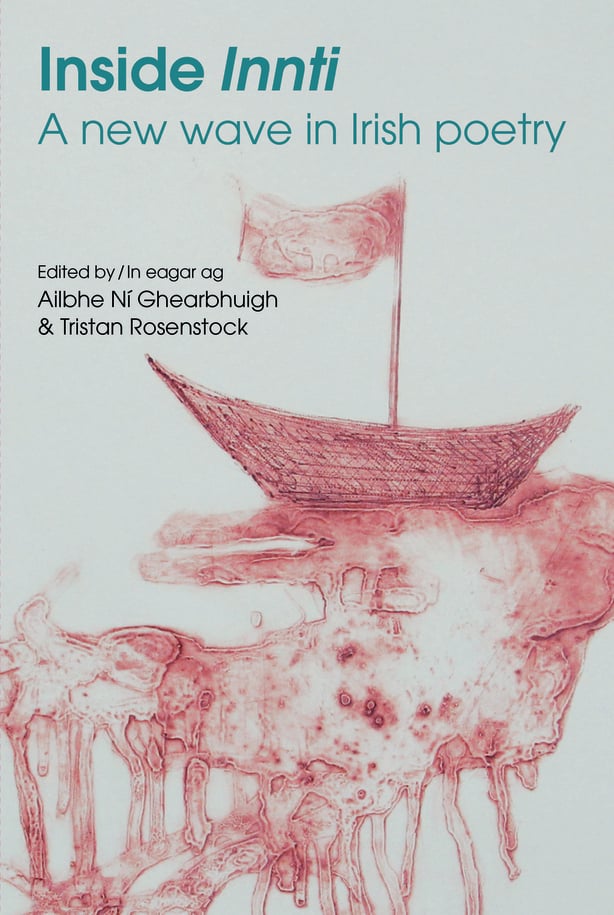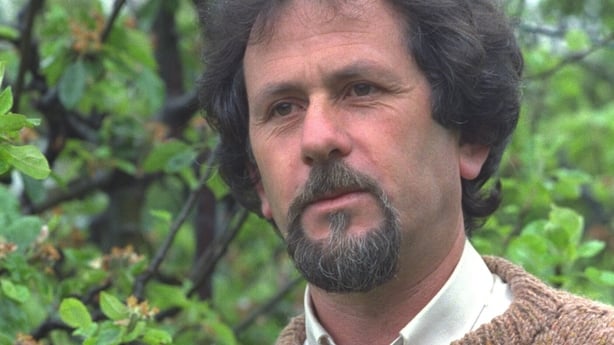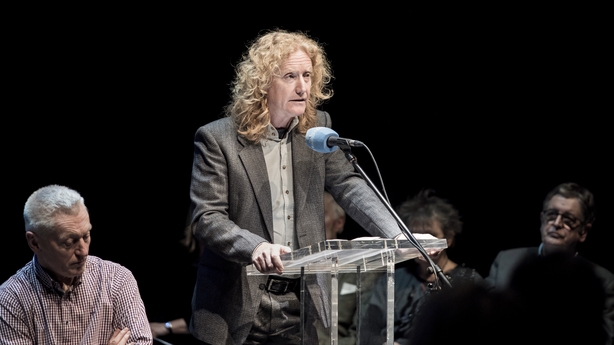The recently published book Inside Innti: A new wave in Irish Poetry has as its subject what is generally agreed to be the third wave of Irish language poetry of the 20th century.
This wave was said to have modernized poetry in Irish - or as poet Nuala Ní Dhomhnaill has said, it introduced into it sex, drugs, and rock n' roll.
Innti, first a broadsheet and then a journal, was established in 1970 by students at University College Cork under the maverick editorship of Michael Davitt.
Ailbhe Ní Ghearbhaigh and Tristan Rosenstock, the book’s co-editors, along with the other contributors, are to be congratulated on a welcome and handsome publication. It admirably takes its subject seriously, providing considered and totally engaging insights into a significant aspect of Irish cultural life.
There are three new essays in English and seven in Irish, an introduction, forward and afterword, interviews, endnotes, bibliography, acknowledgements, index, and an iconic photograph by Bill Doyle.
The cover image by artist Noelle Noonan deserves a mention too.

Ní Ghearbhaigh and Rosenstock acknowledge the part English, Irish and other languages played in the formation of poets Nuala Ní Dhomhnaill, Michael Davitt, Liam Ó Muirthile and Gabriel Rosenstock. They recognise the linguistic reality of the daily lives of the poets in a way their poems do.
The foreward in English is by self-declared proud Corkonian, writer and scholar Alan Titley. An essay by him in a 1990s RTÉ Radio Thomas Davis Lecture from the series Irish Poetry After Kavanagh, foreshadows his contribution to the book. In it, Titley declares that the Innti phenomena brought poetry in Irish out of the academy and back onto the streets, or at least back into the pubs and halls… and reinvented poetry as a public art.
Indeed, backing up Titley’s point, this writer recalls when a teenager, experiencing a cool reading by the Innti poets in the relatively new and equally cool Douglas Hyde Gallery in Dublin:
We need your consent to load this rte-player contentWe use rte-player to manage extra content that can set cookies on your device and collect data about your activity. Please review their details and accept them to load the content.Manage Preferences
Listen: Alan Titley’s Thomas Davis essay on the Innti Poets
Historian Gearóid Ó Tuathaigh’s essay lends its own authority to the enterprise. In his far-reaching, qualified contribution, he writes how: 'In any consideration of pulses of creativity or the spark of individual genius, historical determinism is a treacherous terrain. This essay…is a selective consideration of certain economic social and cultural developments in Ireland from the 1950s to the early 1970s that may provide an enabling context for addressing what the Innti project signified in its own time’.

The particularities of the poetry scene in Irish beyond Cork, when the Innti generation was emerging is given by academic and critic Eoghan Ó hAnluain in a 1985 RTÉ Radio interview from the series Agallamh na BhFilí with poet Liam Ó Muirthile, who by then was a broadcaster with RTÉ:
We need your consent to load this rte-player contentWe use rte-player to manage extra content that can set cookies on your device and collect data about your activity. Please review their details and accept them to load the content.Manage Preferences
Listen: Liam Ó Muirthile talks to Eoghan Ó hAnluain
In his essay, poet Louis de Paor, a decade younger than the original Innti poets, notes the conducive atmosphere of UCC in the late 1960s into the early 1970s: the student Irish society and journal An Síol, and the lively cohort of student poets writing in English. There were three cultural giants on the university campus: composer Séan Ó Riada in the Music Department, Seán Ó Riordáin in his capacity as poet in residence; and Professor of Irish, Seán Ó Tuama who was inspirational, de Paor says, for those determined to break through to new ways of thinking and being.

(Pic: Paul McCarthy)
In his 2018 contribution to RTÉ Radio's Miscellany50 project de Paor describes Cork in 1973, including the importance for him of Liam Ó Muirthile, who had died a few months before this recording.
We need your consent to load this rte-player contentWe use rte-player to manage extra content that can set cookies on your device and collect data about your activity. Please review their details and accept them to load the content.Manage Preferences
Listen: Louis de Paor from Miscellany50
In other Inside Innti essays, Catríona Ní Chléirichín looks comparatively at sexuality in the poetry of Nuala Ní Dhomhnaill and that of her male contemporaries. For Ríona Ní Fhrighill, Ní Dhomhnaill’s lived experience of the Muslim world of Turkey deserves more consideration. Gearóid Denvir focuses on Michael Davitt, while Pádraig de Paor’s essay concerns Gabriel Rosenstock. Peter Sirr lays out Liam Ó Muirthile’s embracing of the uncertainties and confusions of experience. Pádraig Ó Cíobháin highlights the draw of Corca Dhuibhne for the imagination. For Colm Breathnach, experiences of poetry workshops in Irish after the establishment of Innti made his decision to write as Gaeilge the natural thing to do. The book’s concluding essay, A Monster Beat by Clíona Ní Ríordáin turns to what this book is more generally doing: stating the inter-connectedness of poetry writing in English and Irish over the past half-century, and continuing today, through the likes of Cork poets Doireann Ní Ghríofa or Billy Ramsell.
The interviews in the book with Nuala Ní Dhomhnaill (in Irish) and Gabriel Rosenstock (in English) are insightful, and capture the strength of the form to reveal differently to being written about. The interviewee has their chance to speak directly, to react.
In the same way this episode of Agallamh na bhFilí from 1985 shows Liam Ó Muirithile speaking with Nuala Ní Dhomhnaill, both in the process of becoming poets and people to be celebrated:
We need your consent to load this rte-player contentWe use rte-player to manage extra content that can set cookies on your device and collect data about your activity. Please review their details and accept them to load the content.Manage Preferences
Clip of Nuala Ní Dhomhnaill and Liam Ó Muirthile talking in 1985 ( 14.24 + approx.)
Inside Innti: A new wave in Irish Poetry is published by Cork University Press


